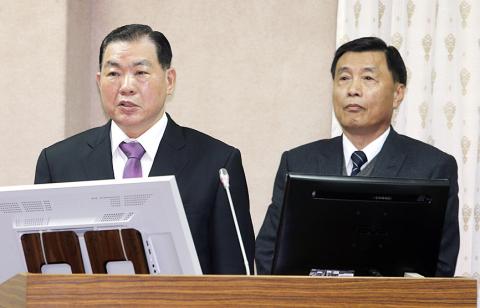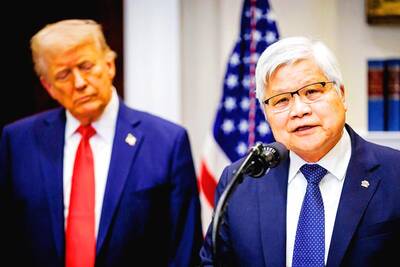The threat of Chinese espionage has increased, although there have been no national security breaches, officials said yesterday, as the Executive Yuan vowed to propose counterintelligence legislation to prevent Chinese spies from infiltrating the nation’s security agencies.
“China will employ all methods [of espionage], and the issue [of Chinese infiltration] is more serious than ever,” National Security Bureau (NSB) Director-General Peng Sheng-chu (彭勝竹) said at a question-and-answer session of the legislature’s Foreign Affairs and National Defense Committee, in response to questions by Democratic Progressive Party (DPP) Legislator Lo Chih-cheng (羅致政) regarding whether China had become more aggressive in penetrating the nation’s security agencies.
Investigation Bureau Director-General Tsai Ching-hsiang (蔡清祥), National Police Agency (NPA) Director-General Chen Kuo-en (陳國恩) and National Immigration Agency (NIA) Director-General Ho Jung-chun (何榮村) all said that the threat has become more severe.

Photo: CNA
The issue of Chinese espionage was raised after Vice Premier Lin Hsi-yao (林錫耀) told DPP leaders on Wednesday that the Cabinet would devise counterintelligence legislation, in response to DPP Legislator Chen Ming-wen (陳明文) saying that “national security agencies have been infiltrated by China.”
Chinese Nationalist Party (KMT) Legislator Johnny Chiang (江啟臣) questioned whether any intelligence agency had been breached, but the heads of all of the nation’s security agencies — including the Coast Guard Administration, NSB, NIA, NPA and the Military Intelligence Bureau — denied that their organizations had been infiltrated.
The National Intelligence Services Act (國家情報工作法) stipulates counterespionage responsibilities for national security agencies, so there is no need to create new legislation if the existing legal framework already has counterintelligence requirements, Chiang said.
A draft counterintelligence act proposed by the Investigation Bureau stipulates more severe punishments for security breaches and gives counterintelligence agents “semi-judicial rights” to conduct investigations of suspected espionage, but the Executive Yuan has been redrafting the bill following criticism of its potential to allow for the infringement of human rights.
Separately, authorities denied reports that the son of Kim Jong-nam, the murdered half brother of North Korean leader Kim Jong-un, was once hidden in Taiwan to escape assassination.
Kim Han-sol has not entered Taiwan, Ho said, adding that he was unaware of Kim Han-sol having transited through Taiwan en route to another nation.
Peng said he had no idea if Kim Han-sol was in Taiwan.
A man claiming to be Kim Han-sol appeared in a video uploaded to YouTube on Wednesday saying that he was safe with his mother and sister.
The group that uploaded the video — Cheollima Civil Defense, an organization that helps North Korean defectors — expressed gratitude to the Netherlands, China, the US and a “fourth government to remain unnamed” for providing assistance in protecting the three.
South Korean and Japanese media reported that the fourth government was Taiwan, and that Kim Han-sol had arrived in Taiwan on Feb. 15, two days after his father was assassinated at Malaysia’s Kuala Lumpur International Airport.
The assassination is widely believed to have been carried out with the authorization of Kim Jong-un to secure his regime.
Two Malaysian employees of the UN World Food Programme who were stranded in North Korea because of a travel ban have left the country, the UN said yesterday.
Nine other Malaysians are believed to still be stuck there after the two countries’ diplomatic relations broke down over the killing of Kim Jong-nam.
The UN employees were among hundreds of ordinary citizens caught up in the escalating diplomatic battle.
The two arrived in Beijing yesterday, World Food Programme coordinator for global issues Jane Howard said.
“The staff members are international civil servants and not representatives of their national government,” she said.
When North Korea issued its travel ban earlier this week, Malaysia responded in kind, barring North Koreans from leaving its soil.
The nine Malaysians still believed to be in North Korea are three embassy workers and their family members. About 1,000 North Koreans are believed to be in Malaysia, until recently one of the few countries where North Koreans could travel without a visa.
Malaysian Prime Minister Najib Razak said his government was “in the process of establishing the reasons and motives” behind North Korea’s drastic measure.
He reiterated that diplomatic relations would not be severed to keep the communication line open for negotiations.
Additional reporting by AP

ENDEAVOR MANTA: The ship is programmed to automatically return to its designated home port and would self-destruct if seized by another party The Endeavor Manta, Taiwan’s first military-specification uncrewed surface vehicle (USV) tailor-made to operate in the Taiwan Strait in a bid to bolster the nation’s asymmetric combat capabilities made its first appearance at Kaohsiung’s Singda Harbor yesterday. Taking inspiration from Ukraine’s navy, which is using USVs to force Russia’s Black Sea fleet to take shelter within its own ports, CSBC Taiwan (台灣國際造船) established a research and development unit on USVs last year, CSBC chairman Huang Cheng-hung (黃正弘) said. With the exception of the satellite guidance system and the outboard motors — which were purchased from foreign companies that were not affiliated with Chinese-funded

PERMIT REVOKED: The influencer at a news conference said the National Immigration Agency was infringing on human rights and persecuting Chinese spouses Chinese influencer “Yaya in Taiwan” (亞亞在台灣) yesterday evening voluntarily left Taiwan, despite saying yesterday morning that she had “no intention” of leaving after her residence permit was revoked over her comments on Taiwan being “unified” with China by military force. The Ministry of the Interior yesterday had said that it could forcibly deport the influencer at midnight, but was considering taking a more flexible approach and beginning procedures this morning. The influencer, whose given name is Liu Zhenya (劉振亞), departed on a 8:45pm flight from Taipei International Airport (Songshan airport) to Fuzhou, China. Liu held a news conference at the airport at 7pm,

KAOHSIUNG CEREMONY: The contract chipmaker is planning to build 5 fabs in the southern city to gradually expand its 2-nanometer chip capacity Taiwan Semiconductor Manufacturing Co (TSMC, 台積電), the world’s biggest contract chipmaker, yesterday confirmed that it plans to hold a ceremony on March 31 to unveil a capacity expansion plan for its most advanced 2-nanometer chips in Kaohsiung, demonstrating its commitment to further investment at home. The ceremony is to be hosted by TSMC cochief operating officer Y.P. Chyn (秦永沛). It did not disclose whether Premier Cho Jung-tai (卓榮泰) and high-ranking government officials would attend the ceremony. More details are to be released next week, it said. The chipmaker’s latest move came after its announcement earlier this month of an additional US$100 billion

Authorities yesterday elaborated on the rules governing Employment Gold Cards after a US cardholder was barred from entering Taiwan for six years after working without a permit during a 2023 visit. American YouTuber LeLe Farley was barred after already being approved for an Employment Gold Card, he said in a video published on his channel on Saturday. Farley, who has more than 420,000 subscribers on his YouTube channel, was approved for his Gold Card last month, but was told at a check-in counter at the Los Angeles International Airport that he could not enter Taiwan. That was because he previously participated in two